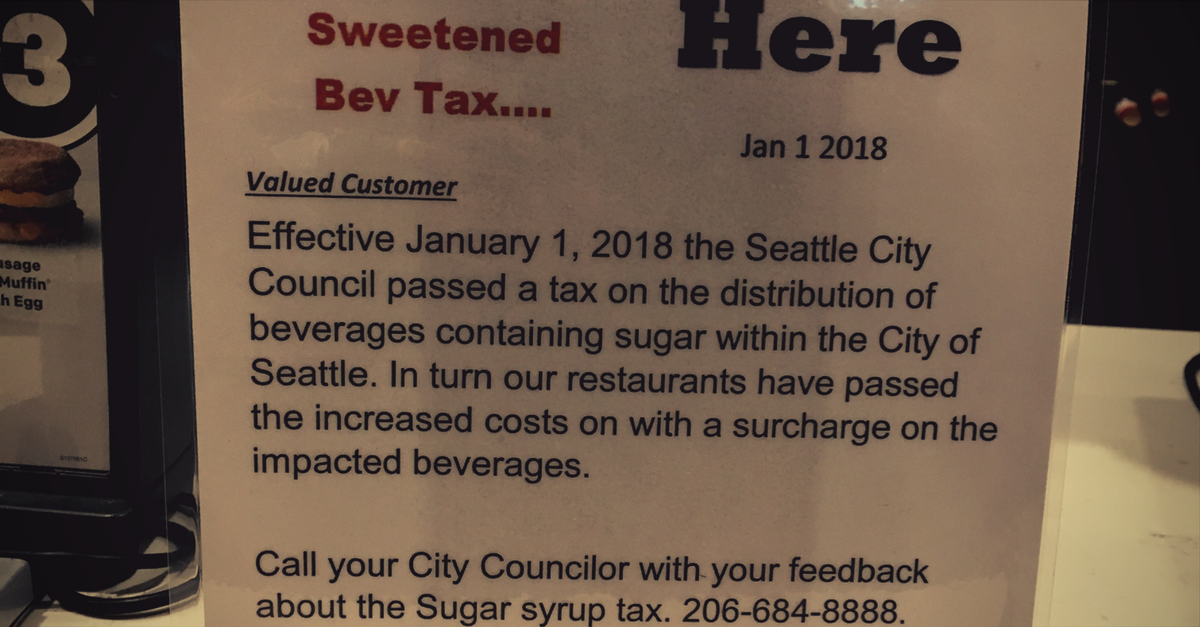
I am currently in Seattle. It’s a progressive place with lots of high income, educated people. It’s the Pacific Northwest where people buy organic vegetables, eat seafood and do lots of outdoors stuff. They should be healthy. But they’re not. Nearly 1 out of 3 people in Washington are obese, nearly 1 in 10 adults have diabetes and nearly 1 in 3 have hypertension.
Nowadays, those numbers are fairly average for the US. But in 1990 even the state with highest obesity rate in the entire nation, Mississippi, had only half that. Every single US state since then has seen their obesity rate at the very least double, if not even triple.
How Bad is it Really?
But is having a bunch of obese people really that bad? Sure, there seem to be some health risks associated with it, but don’t we have more important stuff to worry about? Like the opiate epidemic?
Turns out, obesity is worse than opiates: Opiates kill approximately 11,500 Americans per year on average. Obesity? 300,000. That’s nearly as many as the entire casualties of the Syrian civil war – and that’s all government forces, opposition, and civilian deaths combined. To use another comparison: On average, obesity claims more American lives in an 8 hour period than the Afghanistan war did in the last 5 years.
Is there something that’s worse? Of course, there is: Cancer. It is one of the few things that claims more lives in the US: 600,000 a year. But that’s any and all cancers combined. That means it takes about 100 different types of cancer to win over obesity when it comes to killing us.
What’s Causing It?
Americans eat way more calories than they used to. Math says that and so does Harvard University. Did you know that the number 1 source of energy that Americans consume are ‘grain-based desserts’? That’s cakes, cookies, donuts, pies, crisps, cobblers, and granola bars. Let me emphasize that: Americans take in more calories from cakes&cookies than any other food group, including chicken, pasta, and beef.
What separates ‘grain-based desserts’ from plain old ‘grain’? One ingredient: Added sugar.
One reason why Americans eat so many cookies, is because they’re sweet. Added sugar is one of the main, single components of a diet that sees increased calorie intake. Not only does it not have any nutritional benefit, it genuinely gets us addicted. Granola bars and its doughy friends make up a massive load of calories, but they’re not the prime culprits of added sugar in our diets. It’s soda: 35.7% of all of our added sugar intake comes from soda, energy drinks and sports drinks.
What this means is that soda is the biggest source of an addictive substance that causes mortality at ten times the rate opiates do. We give it to children. We allow advertising for it. We accept large discounts on wholesale quantities. We set up automatic dispensing machines at every office, school and public space. Should we maybe reconsider this?
What’s Being Done About It?
I’m not the first person to notice this and a lot of other people have opted to not only commit their time, but also their funds to help stem the tide of the poison epidemic that is today’s diet. Why haven’t your heard about this? Or if you heard about it, why does it seem such a small issue compared to other addictions and illnesses on our attention radar?
One reason could be money. We spend about 2.2 billion USD a year in the US on cancer research. That makes sense. Not because cancer kills people, but because we can sell more than 100 billion worth of cancer meds every year worldwide. Nice pay off on those 2.2 billion we spend on research.
What about obesity? The market for obesity meds is less than 0.1% of the cancer med market: 160 USD million in 2014. Those 160 million spent on obesity meds is the equivalent of a $1 cheeseburger while cancer gets a $1,000 dollar wine&dine experience. That’s one real fancy date. That’s not a lot of motivation to develop new meds.
If obesity causes such a high mortality rate, shouldn’t that somehow result in a higher demand and market for solutions? A lot of ways that people try to fight obesity is through lifestyle changes and healthy food, so it’s not entirely fair to just compare the medication spend. However, another reason why comparatively so little money and attention is spent on ‘curing’ obesity, is because most of the cost of it is being born by someone else.
Who Is Paying For It?
Why care? Unlike smoke, you don’t get sick by people eating a donut next to you. Their problem, right? No. Because the majority of costs are externalized. Drinking three cans of coke a day for 6 years will cost you less than $2,000 dollars. Seems like a lot of money, right? Except, that’s a fraction of the actual cost this incurs.
This amount of soda though contains actual one million calories (or the equivalent of a 120kg weight gain). Want to burn that at the gym? That’s 2,400 hours of workouts. That’s more hours than the average person works per year. You’d have to to take a sabbatical every 6 years to and make working out your full time job to burn the amount of weight you’d put on.
The average yearly salary in the US is USD 44,148 per year. In order to offset those USD 2,000 worth of soda, you’d have to forego more than USD 40,000 to ensure you’re not buying your next bottle while sitting in one of those motorized shopping cart scooter.
What if you don’t mind the weight gain and just keep powering through (motorized or not) without ever hitting the gym? One of the most common obesity complications is diabetes. The cost of diabetes is roughly USD 7,900 per year on average. That’s for the rest of your life, short as it may be. Of course throw in other medical issues that can result from this and you’re quickly looking at USD 70,000 to USD 200,000 for heart bypass surgery. Taking a year off suddenly sounds like a good deal.
This is not only a US problem though. According to the McKinsey Global Institute the cost of obesity worldwide is 2 trillion USD. That’s USD 2,000,000,000,000 or the value of the agriculture industry of the entire planet.
Let me put this into perspective: If we made McDonald’s pay for the costs caused by obesity, their entire yearly profits of 2014 would only pay for 0.0655% of the damage caused by obesity. In other words: The havoc obesity wrecks on our society during the a single shift of a McDonald’s worker would take the entire company an entire year to pay for.
How Can We Solve It?
I believe in people making rational decisions giving the opportunity. If people would be able to pay for things at the time they are caused, it would mean you then don’t need charity to fix stuff. Is there a way to correct things by moving the cost for items to where they are occurred? I believe so.
Take soda, the prime source of added sugar in a US diet. If a soda would be priced at its actual cost rather than just at the combined price of the water, sugar and profit it contains, people would think twice about buying one. Of course that would mean a can of coke would cost more than USD 5.
Since the costs of added sugar have been hidden for so long, that seems like quite the price hike for soda. Yet, looking at the stats provided above, that wouldn’t even account for the full costs of its consumption.
What I’m taking about is commonly referred to as ‘soda tax’ and it’s not exactly a new concept. Seattle just introduced it this year, making it one of five cities in the US who recently launched one. The total price increase for a can of coke? 10 cents. Still a long shot from the actual cost it incurs, but it’s a start.

Who Is Opposing It?
Seattle and Berkeley aren’t the only cities with a soda tax. In the US right now there is a county by county fight over soda tax. Even one where it was instituted and repealed: Cook county (Chicago). After only two months the tax was canned and the opponents of it succeeded in what they wanted: Keeping sugar water cheap.
A lot of opposition to the soda tax center around can be summed up to ‘freedom to choose’ (just like that cowboy in the Marlboro commercials) and ‘not taxing the poor’ (the same reason why third world countries don’t tax cheap cigarettes) and the unspoken ‘protect entrenched interest’.
Who makes up that pro-diabetes alliance? Is it just ‘big sugar’? Or ‘big high fructose corn syrup’? Nope. Everyone who is worried that we’ll tax food according to health impact if full in on opposing soda tax: Big juice (which essentially is sugar water with good PR), McDonald’s, Burger King and many other food and beverage corporations. It’s a who-is-who of companies worried they’ll be next. Want to know what not to eat? Basically anything manufactured by the companies opposing a soda tax.
This said, soda tax has been tried in other countries and for the most part I fail to see any significant impact on obesity rates. Samoa had a soda tax since 1984 and now, 34 years later, 80% of their population is overweight. A soda tax alone won’t solve the problem. That’s not to say it hasn’t had an effect, but it didn’t reverse the obesity trend. For that, we need a lot more.
What’s The Next Step?
I understand that people have a lot on their plates, and figuring out how to eat something that doesn’t take all evening to prepare, is cheap and healthy can be a real challenge.
Regulation might play a role in healthier consumption, as it did with tobacco. Technology might make our behavior more sustainable, as it did with renewable energies. Business might make the right choice cheaper, as it did with mobile phones and availability of internet access.
However, wherever the real break-throughs happen, is when we come to terms with the cost of our consumption. Unfortunately I don’t see that happening for years to come. But one can hope.

Leave a Reply
You must be logged in to post a comment.